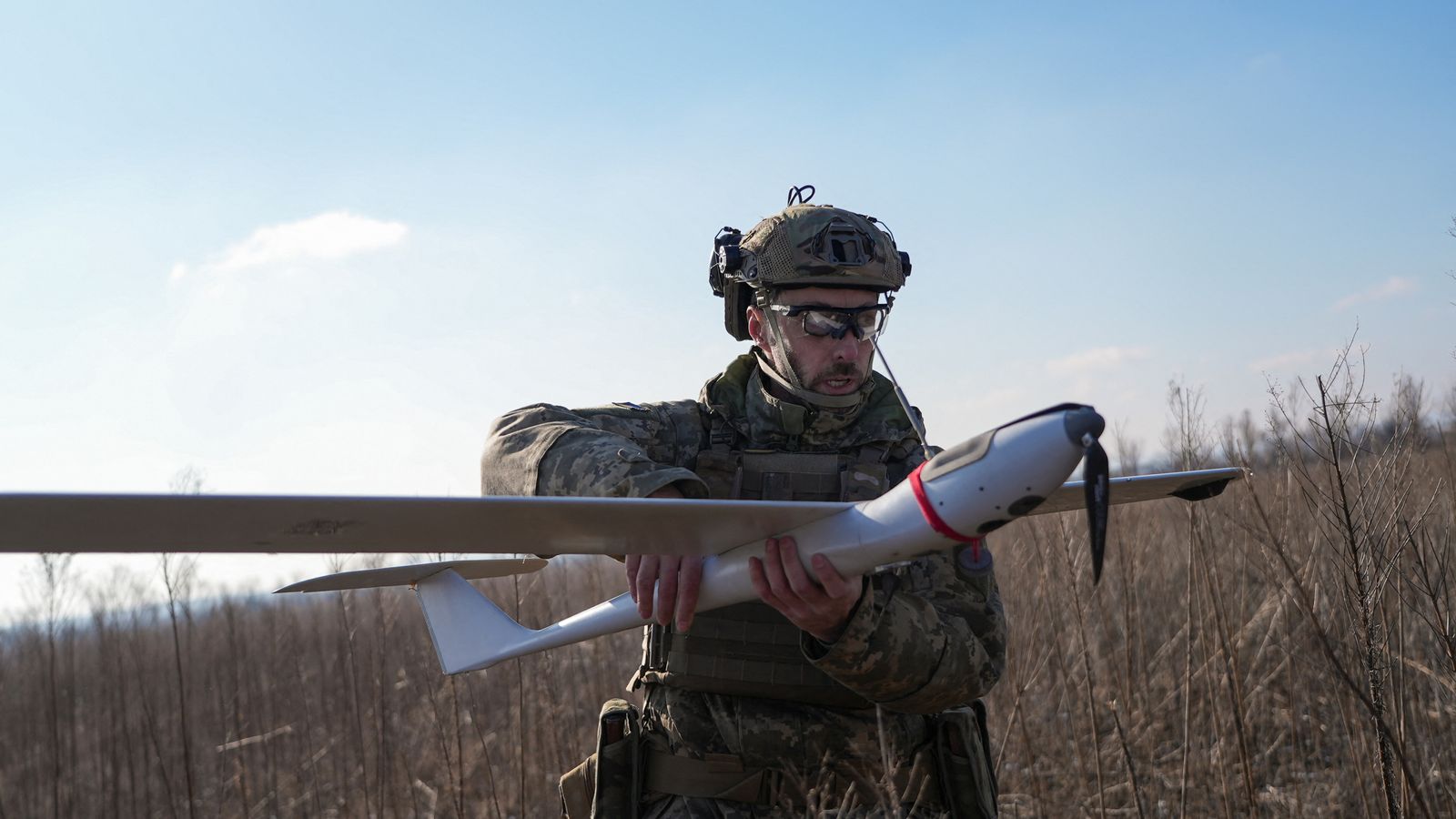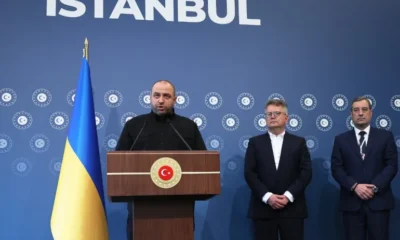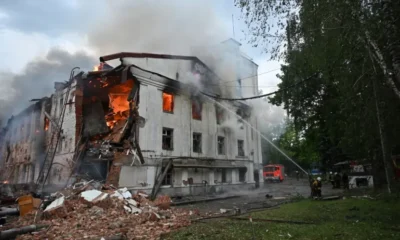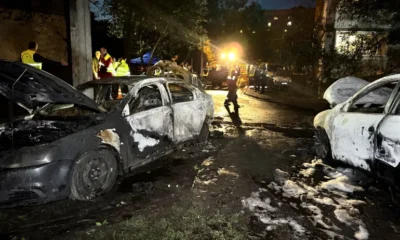Foreign
“Millions Of Drones” Needed For European Defense, Says EU

EU defence commissioner Andrius Kubilius says Europeans will require millions of drones to create an “army” and they need to start preparing now.
The European Union’s defence commissioner has warned Europe must be capable of building a drone army in case Russia attacks.
Military intelligence has suggested Russian forces could be ready to strike a NATO country within the next five years.
In order to defend themselves, Andrius Kubilius says Europeans will require millions of drones and need to start preparing now.
“Russia can have around five million drones, so we need to have capacities bigger than those in order to prevail,” he told Sky News, warning that if President Putin ordered an attack, the target would face a “battle-tested” Russian army with the ability to use “millions of drones”.
The 2022 invasion of Ukraine sparked a revolution in drone warfare.
Facing one of the world’s strongest militaries, the Ukrainians used the cheap, adaptable technology to their advantage.
It estimates its drone units are now responsible for 80% of Russian frontline losses.
Mr Kubilius has visited Ukraine to learn the lessons from the battlefield.
Along the 1,200km (745 mile) front line is an area nicknamed “Death Valley”.
“Nothing can move. Everything is controlled by drones. A traditional tank in that zone survives six minutes,” he explained.
This year, Ukraine’s expected to produce more than four million drones.
Contemplating how many units other countries would need, the commissioner used the example of his home country of Lithuania.
The former Soviet republic shares a border of around 900km (559 miles) with Russia and Belarus.
“If Ukrainians need four million for 1,200km, we need something like three million drones for one year if the war is starting, if ‘Day X’ is coming,” he said.
To try to stay ahead in the fight, both Russia and Ukraine are constantly updating their drone technology.
For this reason, the commissioner believes that rather than stockpiling drones now, which will go out of date, Europe should instead build up teams of pilots, engineers, and producers ready to scale up production should the time come.
“On the European continent, at the moment, there are only two armies battle-tested with the ability to use millions of drones: one is Russian, which is planning new aggressions; another one is Ukrainian,” said Mr Kubilius.
“We need to learn a lot from Ukraine… how to organise defences against millions of drones, and also how to make your defence industry innovative,” he added.
It’s a point many in the business agree with.
German start-up STARK has been testing loitering munitions or “attack drones” ready to supply to Kyiv.
“It’s all made for easy handling for soldiers, so you don’t have to use any tools on the front line, and you just plug in the rudders,” said STARK’s senior vice president, Josef Kranawetvogl, as he quickly clicked the unit’s tail together.
He spent 18 years in the German military before making the jump to weapons production.
He says staying ahead of the enemy requires tactics and technology to be frequently updated.
“Every day you have to adapt. You have such fast development cycles in Ukraine – two or three weeks, then there’s something new upcoming and you have to be prepared for this.”
Since the start of June, Russia has repeatedly used drone swarms to attack Ukraine.
It involves hundreds of drones hammering cities in one night.
I asked Josef whether he believes NATO’s European members are ready to defend against such an attack.
“I see quite a lot of European armies starting right now to develop or to purchase unmanned systems, and it’s a good development, but it’s all about time. How can we speed up?” he replied.
Close to the border with France, another German start-up, Alpine Eagle, is testing defence drone units for Ukraine.
“This is our interceptor drone,” explained the company’s CEO, Jan-Hendrik Boelens, holding up a prototype which looks a bit like a small black plane. The interceptor is carried underneath a large grey drone.
On-board radar means it can be fired at enemy drones up to 5km (3 miles) away.
Jan thinks that could be a game changer in an aerial battle as it means hostile units could be picked off before they get close.
And he believes NATO is unprepared if one of its countries was to be hit by a wave of drones like those in Ukraine.
“We are absolutely not ready in my view,” he said.
He explained that Ukraine produced around 1.3 million drones a year last year.
“I would be surprised if NATO even bought a thousand drones last year. I think Germany procured, I don’t know, 100, maybe 200. So now you do the math on what that means and how quickly you run out of drones.
“If Ukraine consumed 1.3 million drones per year, that’s 3,000 a day. So, if you have 100 in your inventory, that would not last an hour.”
A spokesperson from the German Defence Ministry said the numbers stated “do not closely reflect reality”.
“Drones are now part of everyday life for soldiers, they are omnipresent and are used extensively in service operations and training,” they added.
Drones are a key part of NATO’s defence plan.
The alliance’s leadership has repeatedly said producing, procuring, and protecting against drones is a priority.
At the NATO summit, members agreed to boost defence spending to 5% of gross domestic product (GDP) by 2035.
In addition to increasing training and development, NATO Chief Mark Rutte has said he wants more investment in drone technology as well as boosting air defences fivefold.
“We see Russia’s deadly terror from the skies over Ukraine every day, and we must be able to defend ourselves from such attacks,” he told an audience at the summit.
Lessons from Ukraine have prompted members to embrace unmanned technology in various ways.
Britain is one of the countries pledging to put drones front and centre of its new defence plan.
Earlier this month, the UK government’s Strategic Defence Review outlined a new way forward for British Army warfighting based around a drone-centric 20-40-40 strategy in which uncrewed systems are deployed for first wave attacks, before tanks, attack helicopters and other manned platforms arrive on the battlefield.
In essence, the new weapons mix would be 20% traditional heavy platforms (like tanks), 40% single-use expendable drones and munitions, and the remaining 40% reusable, high-end drones.
It’s been confirmed that an extra £2bn will be spent on army drones this parliament.
Defence Secretary John Healey said Britain’s adversaries were working more in alliance and technology was changing how war was fought.
“Drones now kill more people than traditional artillery in the war in Ukraine and whoever gets new technology into the hands of their armed forces the quickest will win,” he said.
This week, the prime minister announced a deal with Ukraine to co-produce drones.
Germany and Denmark have made similar agreements with the German Ministry of Defence, telling Sky News that drones are a top priority.
In a drone showroom in central Berlin, we meet Sven Weizenegger, head of the German military’s cyber innovation hub.
He said they have noticed a boom in pitches from potential suppliers.
Every day, his department receives up to 20 enquiries from companies asking how their products could be used by the military.
He believes things need to move more quickly so soldiers get weapons faster.
“We are very advanced in the innovation process. That means we have a lot of ideas and many companies that are ready to deliver,” he explained. “Unfortunately, what we are not good at right now, due to our current processes, is getting these things into real operations, into frontline use. We need to fix that.”
Germany has promised to turbo-charge defence spending, with the Chancellor pledging to create the “strongest conventional army in Europe”.
Plans announced this week include boosting unmanned systems and air defences.
The German Ministry of Defence said it couldn’t reveal stock levels due to security, but a spokesperson confirmed the country is investing in a range of different units, including signing two contracts for attack drones.
“We are procuring not just a few but quite large quantities and testing them directly with the troops,” the spokesperson added.
However, they agreed with the EU defence commissioner that rather than stockpiling tech which would go out of date, it was better to have a system in place to allow for large quantities to be made quickly in the event of war.
In May, the EU approved a €150bn (£125bn) loan scheme to boost defence production across the bloc.
News.sky.com
Foreign
Cabinet Reshuffle: President Sacks Finance Minister

South Sudan President Salva Kiir fired Finance Minister Bak Barnaba Chol in a reshuffle that was unveiled on state television on Monday evening.
Chol was appointed to the post in November, following the president’s firing of Athian Diing Athian just two months after his appointment.
Kiir appointed Salvatore Garang, an economist trained at the University of Khartoum in Sudan, as the new Minister of Finance.
Garang previously served as finance minister from 2018 to 2020, a period marked by economic reforms and fiscal strains.
During his first stint in the role, local media reported that Garang faced corruption allegations, including that he allocated 100,000 dollars to cover the cost of his son’s funeral.
He has not commented on the allegations.
The decree also removed several other senior officials, including the commissioner general of the National Revenue Authority, as part of the broader administrative changes.
Analysts say Kiir regularly makes changes to ranks in the military and government to maintain control as he contends with armed conflict and speculation about his eventual succession.
No reason was given for the ninth change in the finance minister since 2020.
-Source: (Reuters/News Agency of Nigeria NAN)
Business
NCFRMI Reiterates Commitment to Effective Implementation of Global Compact for Migration

National Commission for Refugees, Migrants and Internally Displaced Persons (NCFRMI), has reiterates its commitment to effective implementation of the Global Compact for Migration.
The Honourable Federal Commissioner, NCFRMI, Hon. Dr. Tijani Aliyu Ahmed disclosed this in his opening remark at the just concluded Voluntary National Review (VNR) on the implementation of the Global Compact for Safe, Orderly and Regular Migration (GCM) ahead of the 2026 International Migration Review Forum (IMRF).
The event which was held between February 17 and 21 at the Lagos Continental Hotel, Victoria Island Lagos, had the International Organisation for Migration, other international partners, members of the civil society, federal and state government agencies among others in attendance.
Speaking, Dr Tijani extended appreciation to the Federal Government, the United Nations Network on Migration for the sustained technical guidance, institutional support and capacity building provided to Nigeria in the implementation of the Compact.
“I equally acknowledge the invaluable support of the Resident Coordinator’s Office for strengthening system-wide coherence and coordination across the United Nations Country Team and partners in Nigeria.”
He recalled that Nigeria adopted the Global Compact for Migration following its endorsement by the United Nations General Assembly in December 2018, and “since then we have demonstrated sustained political will and institutional commitment to its implementation. As a Champion Country, Nigeria has taken deliberate steps to domesticate the principles and objectives of the GCM within our national migration governance framework.
“The recently validated revised National Migration Policy and its integrated Implementation Plan, which doubles as Nigeria’s National GCM Implementation Plan, stand as clear evidence of this alignment between global commitments and national action.”
He added that in preparation for the first IMRF in 2022, Nigeria conducted its inaugural Voluntary National Review in Lagos through a whole-of-government and whole-of-society approach. “The process strengthened coordination among stakeholders and informed Nigeria’s national report, pledge and interventions at IMRF 2022. Building on that foundation, Nigeria convened a second Voluntary National Review in August 2024 in Abuja, structured around Technical Working Groups covering Labour Migration, Migration Data, Border Management, Return, Readmission and Reintegration, and Diaspora Engagement. The outcomes informed Nigeria’s engagement at the regional review and reinforced sustained national monitoring.”
This 2026 Review according to him is required to track progress since the 2024 regional review, assess implementation across the twenty-three objectives of the Compact, and consolidate national priorities, challenges and areas for improvement ahead of IMRF 2026. “Over the next three days, discussions will follow the GCM review template and align with the thematic areas of the IMRF roundtables. Breakout sessions chaired by members of the United Nations Network on Migration and supported by national thematic leads will evaluate progress, identify lessons learned and generate structured talking points to guide Nigeria’s participation at IMRF 2026.
“This consultation also provides an opportunity to stock take Nigeria’s pledges made at IMRF 2022, highlighting achievements, gaps and opportunities for renewed commitment. Furthermore, building on the evidence of impact from Nigeria’s side event at IMRF 2022, preparations are underway for a side event at IMRF 2026 to showcase practical achievements, lessons learned and pathways for strengthening regular migration channels.
“At this juncture, I would like to reiterate the unwavering commitment of the National Commission for Refugees, Migrants and Internally Displaced Persons, to the effective implementation of the Global Compact for Migration and to sustaining the whole-of-government and whole-of-society approach that underpins this national process.
“We remain deeply appreciative of the consistent support of the International Organization for Migration and other members of the United Nations Network on Migration in strengthening Nigeria’s migration governance efforts. As we prepare for IMRF 2026, we look forward to sustained technical collaboration and partnership to facilitate Nigeria’s effective engagement at the Review Forum and the successful delivery of our proposed side event. Continued cooperation will be critical in transforming commitments into tangible, evidence-based results.”
Foreign
Bloodshed At Friday Prayers As Mosque Bombing Claims Many Lives
A bombing at Khadija Al-Kubra mosque on Islamabad’s outskirts killed 31 people and injured at least 169 during Friday prayers. Witnesses described scenes of chaos, with bodies and wounded lying inside the mosque as rescuers transported victims to hospitals. Pakistani authorities and leaders condemned the attack, launched investigations, and called for urgent medical assistance and blood donations.
A devastating bombing struck the Shiite mosque of Khadija Al-Kubra on the outskirts of Islamabad, Pakistan, during Friday prayers, leaving at least 31 people dead and 169 others injured, officials said. Police are investigating who wa was behind the explosion, AP reported.
Witnesses described scenes of chaos as worshippers were caught in the blast. Television footage and social media posts showed rescuers and residents rushing the wounded to nearby hospitals. Hussain Shah, who was praying in the mosque courtyard, recounted the moment of the attack. “I immediately thought that some big attack has happened,” he said. Entering the mosque, he saw bodies on the carpeted floor and people screaming for help. Shah estimated around 30 bodies inside, while many more were wounded.
Authorities have not received a claim of responsibility for the bombing, though suspicion is expected to fall on militant groups such as the Pakistani Taliban or regional affiliates of the Islamic State, which have previously targeted Shiite communities.
Militants in Pakistan often strike security forces and civilians, with recent months seeing a rise in attacks across the country. Islamabad Deputy Commissioner Irfan Memon updated the casualty numbers shortly after the initial reports. President Asif Ali Zardari and Prime Minister Shehbaz Sharif condemned the attack and extended condolences to the victims’ families. “Targeting innocent civilians is a crime against humanity,” Zardari said. Sharif ordered a full investigation, saying, “Those who are responsible must be identified and punished.”
Interior Minister Mohsin Naqvi urged hospitals to provide the best possible care for the wounded. Shiite leader Raja Nasir called the attack a serious failure in protecting human life and appealed for blood donations, noting that hospitals were in urgent need. The bombing occurred near an event attended by Uzbekistan’s President Shavkat Mirziyoyev in Islamabad, several miles from the mosque. Islamabad has previously suffered major attacks, including a 2008 bombing at the Marriott Hotel that killed 63 people. The incident comes days after multiple attacks in Balochistan by the outlawed Baloch Liberation Army, which killed roughly 50 people and prompted security forces to eliminate more than 200 militants.
-

 Politics2 days ago
Politics2 days agoAssembly Confirms Popular Redeemed Pastor As Deputy Governor
-

 Foreign2 days ago
Foreign2 days agoCabinet Reshuffle: President Sacks Finance Minister
-

 Business1 day ago
Business1 day agoJUST IN: 13 Banks May Shut Down In March As CBN Confirms 20 Safe For Recapitalisation Deadline
-

 Politics7 hours ago
Politics7 hours agoBREAKING: “Serial Disrespect” Sparks Drama As Senate Order Arrest Of Tinubu’s Appointee
-

 Politics7 hours ago
Politics7 hours agoOpposition Leaders Urge N’Assembly To Begin Fresh Electoral Act Amendment
-

 Opinion7 hours ago
Opinion7 hours agoEdo State To Spend N1billion On Armoured Car For Speaker, N4.6billion On Vehicles For Lawmakers










